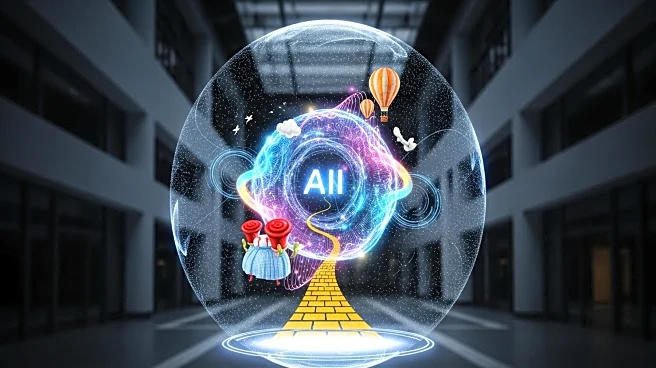What's Happening?
The Las Vegas Sphere, a unique venue with a seating capacity of 17,600, is showcasing an AI-enabled version of 'The Wizard of Oz'. This adaptation utilizes advanced technology to transform the classic 1939 musical into an immersive experience. The Sphere features a 160,000-square-foot LED wall, creating a spectacle with elements like wind machines and haptic signals. The production involves AI models trained on archival materials to generate performances, enhancing the visual and auditory experience with 16K resolution and 167,000 speakers. The project, backed by Warner Bros and Google, aims to offer an experiential version of the film, diverging from traditional cinema restoration.
Why It's Important?
This innovative approach to cinema at the Sphere represents a significant shift in how classic films can be reimagined using technology. It highlights the potential of AI in the entertainment industry, offering new ways to engage audiences and revitalize interest in theatrical moviegoing. The project also raises questions about the role of AI in creative processes and its impact on traditional filmmaking. As the entertainment industry explores new mediums, this development could pave the way for more immersive and interactive experiences, potentially influencing future productions and audience expectations.
What's Next?
The Sphere's success with 'The Wizard of Oz' could lead to more AI-driven adaptations of classic films. The venue's unique capabilities may attract other productions seeking to leverage its immersive environment. As demand grows, the Sphere's owner, James Dolan, is considering expanding the concept to other locations. This could result in a broader adoption of AI technology in cinema, prompting discussions among filmmakers, studios, and audiences about the future of film and the balance between innovation and preservation of classic works.
Beyond the Headlines
The use of AI in transforming 'The Wizard of Oz' at the Sphere touches on ethical considerations regarding the preservation of cultural heritage. It challenges traditional notions of authorship and creativity, as AI-generated performances alter the original work. This development may spark debates about the authenticity of AI-enhanced art and its implications for the creative industry. Additionally, the project reflects broader societal changes, as technology increasingly influences cultural consumption and the entertainment landscape.









